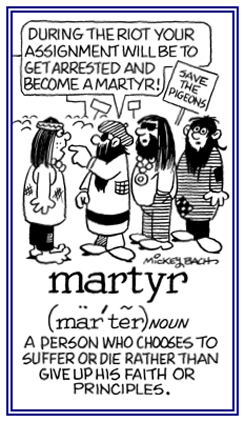martyr-
(Greek: (martus, martur-); Late Greek: (martur); Late Ecclesiastical Latin (martyr), Old English (martyr), Middle English (martir); witness)
Adopted directly into most Germanic languages, but Old Norse substituted native formation pislarvattr, literally, "torture-witness".
2. A person who makes great sacrifices or suffers much in order to further a belief, a cause, or a principle: Jason's cousin was a martyr because of his efforts to save the woman who was drowning when her car swerved off the road into the river.
Madelyn served as a martyr because she donated so much time and effort at least three times a week to feed the homeless people in her community.
3. Anyone who endures great suffering: Marge was a martyr to arthritis.4. Those who make a great show of suffering in order to arouse sympathy: Mark said he was a martyr at his job because he was required to work harder than normally in order to complete his assigned projects.
Most original martyrs died instead of renouncing their religious beliefs.
The Greeks gave us the word which meant "witness (for Christ)". Those who went around preaching the gospel in the early days of Christianity often had to suffer stoning, crucifixion, or maybe become victims of gladiators or lions in the arenas by the less-than-tolerant Romans.
As a result of such treatment, the word martyr has become associated with suffering and death for a belief or for trying to do something that is considered to be a worthy cause."

Go to this Word A Day Revisited Index
so you can see more of Mickey Bach's cartoons.
2. To kill somebody for refusing to deny a strongly held belief; especially, a religious belief: "The terrorists were in the process of martyring a young girl because she was publicly known in Pakistan to advocate education for all girls."
3. To bring difficulties, suffering, or hardship on oneself for a belief: "The young man said he was willing to martyr himself, if necessary, in order to overthrow the ruler of his country."
2. Extreme suffering or torment.
2. A church or other edifice built at a site, especially a tomb, associated with a Christian saint.
2. To torment and torture like a martyr. Also spelled, especially British, as martyrise.
2. Alternate of martyrological.
2. An historian of martyrs.
3. Someone who specializes in the accounts of the lives and manners of the deaths of martyrs.
4. A writer of or a specialist in martyrology.
2. A history of religious martyrs.
3. Such histories collectively.
4. A list or catalogue of martyrs.
5. An account of the life and manner of the death of a martyr.
6. The branch of ecclesiastical history or hagiography that deals with martyrs.
